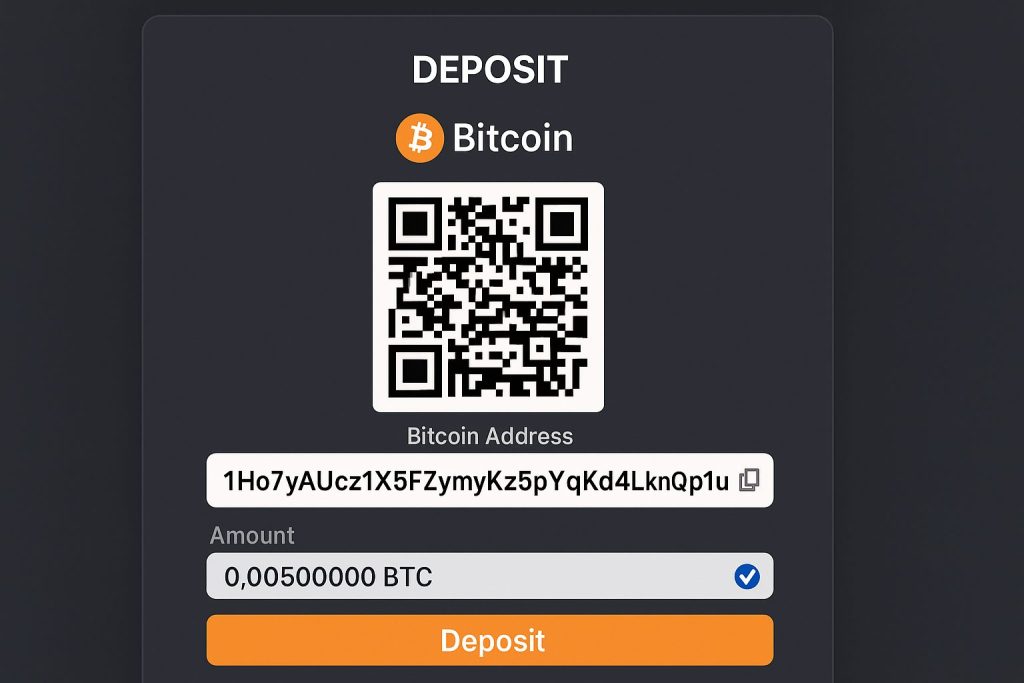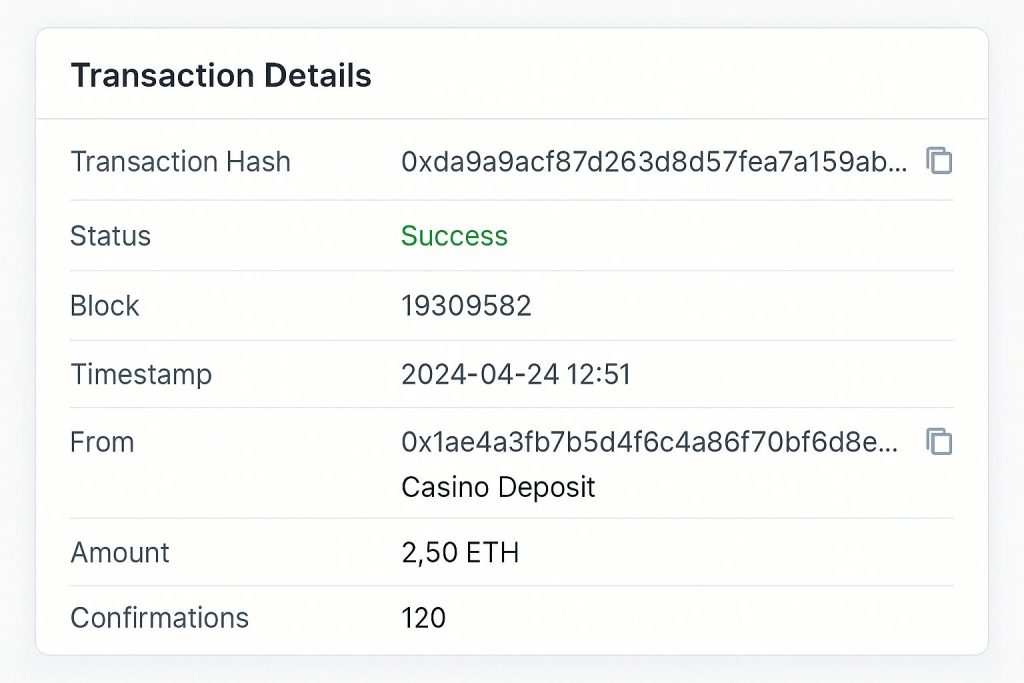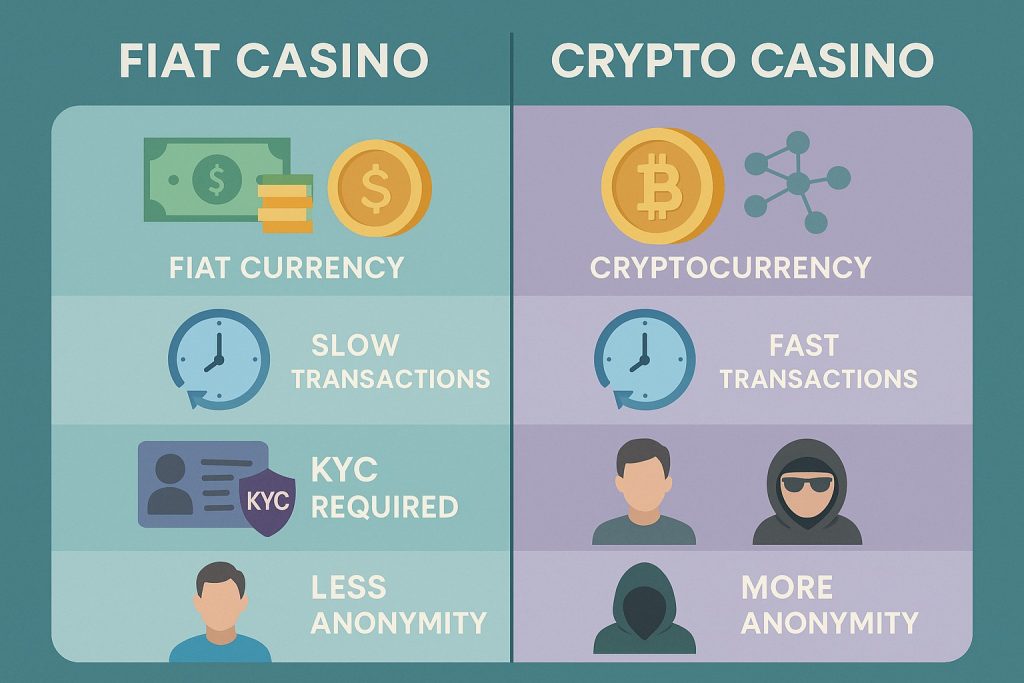
If you’ve spent any time in online gambling communities lately, you’ve probably noticed the crypto casino buzz. Sites where wagers are measured in Bitcoin or Tether are no longer fringe curiosities; they’re a multi‑billion‑pound industry. Industry reviewers describe the best crypto casinos as VIP experiences that promise better games, faster payouts and stronger bonuses than conventional sites. This arena is a dream because it blends technology, finance and entertainment – but it’s also fraught with misinformation. As someone who has spent years writing about gambling and blockchain technology, I’ll guide you through this landscape using first‑person insights and a healthy dose of scepticism.
In this technical yet conversational deep dive, we’ll explore how casinos with crypto work, why they appeal to players seeking anonymity or lower fees, and what to look for when choosing a platform. We’ll examine differences between traditional and blockchain‑based gambling, the mechanics of digital wallets and smart contracts, and the regulatory nuances that still shape this space. Throughout, I’ll draw on authoritative sources such as industry guides and comparison sites. These sources note that early bitcoin casinos were rudimentary and often unregulated, but modern platforms combine licences from jurisdictions like Curaçao or Anjouan with sophisticated software and provably fair algorithms. We’ll also discuss the risks – volatility, scams and regulatory grey areas – because no overview is complete without them.
Before diving in, it’s worth defining terms. A crypto casino (sometimes called a Bitcoin casino or blockchain casino) is an online gambling platform that accepts deposits and pays out winnings in cryptocurrencies such as Bitcoin (BTC), Ether (ETH), Tether (USDT) or various altcoins. These platforms may accept only crypto or offer hybrid options alongside fiat payments. My aim isn’t to promote any specific brand – you’ll find no affiliate links here – but to equip you with enough knowledge to make informed decisions. Grab a cup of tea and let’s explore.
How Crypto Casinos Work
The core difference between a crypto casino and a traditional online casino lies in the payment layer. Instead of routing transactions through banks and card processors, crypto casinos use blockchain networks. This means that when you deposit funds, you transfer digital assets directly from your personal wallet to the casino’s wallet. There is no intermediary verifying your identity (beyond what the casino requires) and no bank fees. According to comparisons of traditional and crypto casinos, digital coins enable fast payments and lower transaction fees, whereas fiat casinos must pay card companies and wait days for settlements.
To place your first bet, you’ll need cryptocurrency. A beginner’s guide from Scified explains that you can acquire Bitcoin or other coins through exchanges such as Coinbase, Binance or Kraken, via Bitcoin ATMs or by peer‑to‑peer trades. Once you have coins, you must store them in a digital wallet. Wallets come in different forms – online wallets accessible via browsers, mobile apps, desktop software or hardware devices. Hardware wallets are the most secure because they store private keys offline, but they require more setup.
After funding your wallet, you create an account at a crypto casino. Most sites require an email address, username and password, and some request additional Know Your Customer (KYC) information depending on licensing requirements. When you’re ready to deposit, the casino generates a unique crypto address for your account. You send the desired amount from your wallet to this address, and the blockchain network confirms the transaction. Confirmation times vary by network but typically range from minutes to an hour. Once the transaction is confirmed, your casino balance reflects the deposit and you can start playing. The process is straightforward: navigate to the cashier, choose Bitcoin or another coin, copy the wallet address and send your funds.
Withdrawals follow a similar pattern. You request a payout, provide your wallet address, and the casino sends the funds back to you. Because crypto transactions are irreversible, double‑check your wallet address before confirming. Beginner guides stress the importance of verifying addresses to avoid losing funds. The network must again confirm the transaction, and once it clears, the coins appear in your wallet. Unlike bank wires, which can take several days and incur significant fees, crypto payouts often complete within minutes or hours.
Smart Contracts and Provably Fair Games
Many crypto casinos leverage smart contracts – self‑executing code running on blockchain networks – to handle wagers, payouts and game logic. Smart contracts can automate everything from slot spins to card shuffles. This automation removes the need for third‑party auditors, though players still need to trust the underlying code. Some casinos publish open‑source smart contracts, allowing anyone to verify fairness. Others rely on third‑party audits or cryptographic proofs.
A hallmark of the crypto casino movement is the concept of provably fair games. Articles from Mesmeric Games explain that provably fair gambling uses server and player seeds to generate random results. The server seed (controlled by the casino) is hashed and provided to the player before a game round starts; the player can contribute their own seed or use a random one. After the round, the casino reveals the original seed, and players can verify that the hash matches. Combining these seeds with a counter produces a random result that cannot be altered mid‑game. In theory, this system ensures that neither the casino nor the player can cheat; in practice, it gives transparency unmatched by traditional random‑number generators.
Provably fair games include blockchain‑native titles like Crash, Plinko and dice games, as well as variations of classics such as roulette and blackjack. However, the technology doesn’t guarantee profitability; it simply proves that the result wasn’t manipulated. Still, for many players, the ability to verify fairness is a major draw.
Anonymity and Privacy
One of the biggest attractions of crypto casinos is anonymity. Traditional casinos require personal information, credit card numbers and sometimes physical documents. By contrast, crypto platforms often request only an email and wallet address. Industry comparisons note that crypto casinos require less personal data and allow players to keep more details private. Instead of storing ID copies, operators only check wallet addresses and transaction histories. This reduces both the risk of data breaches and the administrative burden for casinos.
Anonymity, however, is a double‑edged sword. Regulators worry that anonymous transactions facilitate money laundering, tax evasion and underage gambling. As a result, many jurisdictions have introduced rules requiring KYC and anti‑money‑laundering (AML) checks. Curaçao and Anjouan licenses, common among crypto casinos, still permit a level of anonymity but require operators to verify players’ identities for large withdrawals. In practice, this means that while you may not need to provide documents to make small deposits and play, you’ll likely need to pass KYC checks before withdrawing significant sums. Truly anonymous gambling is rare and often restricted to unlicensed sites.
Choosing the Right Crypto Casino
With hundreds of crypto gambling sites available, how do you choose a reputable platform? Rather than relying on flashy bonuses or influencer endorsements, you should evaluate several factors: licensing, security, game variety, payment options, bonuses and customer support.
Licensing and Trust
Always start by checking the casino’s licence. Early crypto casinos operated without oversight, but reputable platforms now hold licences from Curaçao, Anjouan or other jurisdictions. Licensing ensures that operators follow certain standards regarding player protection, segregation of funds and fair gaming practices. It’s not as strict as UK Gambling Commission or Malta Gaming Authority licensing, but it’s better than nothing.
Different licences impose varying KYC requirements and restrict certain markets. Anjouan and Curaçao licences are popular because they allow wider acceptance of cryptocurrencies and impose fewer restrictions. Some casinos also partner with third‑party provably fair auditors or display seals from testing labs. When evaluating a site, look for transparent terms and conditions, proof of licensing and a clear complaints procedure. Avoid platforms that hide their location or operate through shell companies.
Reputation and Community Feedback
Next, research the casino’s reputation. Guides on how to choose a crypto casino recommend checking reviews and player feedback. Forums like BitcoinTalk, Reddit’s /r/BitcoinGambling and independent comparison sites can provide insight into customer service quality, payout reliability and disputes. Look for patterns: a single complaint may be an isolated incident, but recurring issues with withdrawals or bonus terms should raise red flags.
Anecdotally, I’ve found that many players undervalue community input. They chase high bonuses only to discover obscure wagering requirements or slow payouts. Do your homework; no welcome bonus is worth dealing with a dishonest operator. Also, pay attention to the age of the site. Platforms with a longer track record tend to be more trustworthy.
Game Selection and Software Providers
Game variety is crucial. Crypto casinos today offer thousands of titles, from slots and jackpots to blackjack, roulette, poker and speciality games. The best sites integrate games from established providers and up‑and‑coming blockchain studios. Some also develop their own casino originals. When evaluating game selection, consider the quality of software providers, mobile compatibility and the presence of live dealer games.
Common categories include:
- Slots – both traditional and video slots, often with high RTP (return to player).
- Table games – blackjack, roulette, baccarat, poker variants.
- Live dealer games – real‑time video streams with human dealers; essential for players who miss the social aspect of land‑based casinos.
- Provably fair and crash games – blockchain‑native games like Crash or Plinko where you can verify fairness.
If you enjoy poker or sports betting, verify whether these verticals are offered. Some crypto casinos focus solely on casino games, while others integrate sportsbooks or poker rooms. The best casinos with crypto deliver a well‑rounded library to suit diverse tastes.
Payment Options and Supported Coins
Although Bitcoin remains the most popular gambling currency, many sites support multiple coins. The ORDB FAQ notes that some casinos accept Bitcoin, Litecoin, Ether, Dogecoin, XRP and USDT among others. In 2025, players can deposit with a dizzying array of tokens, from major coins like Bitcoin Cash and Tether to meme coins and stablecoins. CCN’s comparison lists coins accepted by a leading casino, including Bitcoin, Ethereum, Tether, Dogecoin, Litecoin, Bitcoin Cash, TRON, Binance Coin, XRP, Binance USD, USD Coin, Shiba Inu, Dai, EOS, Chainlink, Solana, Polygon Matic, The Sandbox, Cronos, APEcoin, Uniswap and even TrumpCoin. However, not all casinos support this many options; choose one that matches your preferred currency.

Stablecoins such as USDT (Tether) and USDC provide price stability. Unlike Bitcoin or Ether, which fluctuate significantly, stablecoins are pegged to fiat currencies (usually US dollars). This reduces volatility and makes it easier to manage bankrolls. Some casinos specialise in USDT casinos, offering bonuses and promotions specifically for Tether deposits. That said, always verify the token standard (e.g., ERC‑20 vs TRC‑20) to ensure compatibility with your wallet.
Bonuses, Promotions and Wagering Requirements
Promotions are a marketing staple in the crypto gambling world. Sites offer welcome bonuses, reload bonuses, free spins, cashback, VIP schemes and loyalty points. The advertisement of deposit matches “200% up to $30,000 plus free spins” is common. But the devil is in the detail. For example, some bonuses are released gradually – 10% of the bonus might unlock each time you wager your deposit six times.
When evaluating bonuses:
- Check the wagering requirements. High rollover multiples (e.g., 60×) make bonuses hard to clear. Prefer casinos with reasonable requirements (20× to 40×).
- Understand release mechanics. Some bonuses release in tranches when you meet wagering milestones.
- Confirm eligible games. Slots usually contribute 100% to wagering, while table games may contribute less or be excluded entirely.
- Note time limits. Many bonuses must be used within a set period (7–30 days). If you fail to meet the requirements, any bonus funds and winnings may be forfeited.
As with traditional casinos, treat bonuses as a perk, not your primary reason to sign up. Focus on reliability and game quality first.
Customer Support and User Experience
Finally, evaluate the platform’s usability and customer service. Does the casino offer 24/7 live chat, email or phone support? Are the terms and conditions clearly written? Are there responsive mobile apps? The best experiences often come from intuitive interfaces, quick support responses and a clear help centre. If you can’t find straightforward instructions on how to deposit or withdraw, consider that a warning sign.
Aesthetics matter too. I’ve seen beautiful interfaces with dark, neon‑lit themes reminiscent of cyberpunk fiction. I’ve also navigated clunky websites that look like they were built in the early 2000s. Visual appeal won’t determine fairness, but it does affect your enjoyment. When you’ll be spending hours playing slots or poker, a modern design and smooth performance make a difference.
Deposit and Withdrawal Mechanics
Depositing and withdrawing cryptocurrency might sound daunting if you’re new to digital assets, but the process is fairly simple once you understand wallet addresses and confirmations. Let’s walk through it step by step.
Acquiring Cryptocurrency
You have several options for obtaining digital coins:
- Exchanges – The most common method. Platforms like Coinbase, Binance or Kraken allow you to buy coins with credit cards, bank transfers or other cryptocurrencies. Fees vary, so compare rates and withdrawal costs.
- ATMs – Bitcoin ATMs enable cash purchases. These machines are increasingly common in major cities but may charge high premiums.
- Peer‑to‑peer platforms – Services like LocalBitcoins or Bisq let you buy directly from individuals. You can negotiate price and payment methods, but ensure the platform’s escrow protection is robust.
After purchasing coins, store them in a wallet. As noted earlier, wallets can be online, mobile, desktop or hardware devices. For smaller amounts or convenience, an online wallet is acceptable. For larger bankrolls, a hardware wallet is recommended.
Making a Deposit
Once your wallet contains cryptocurrency, follow these steps to fund your casino account:
- Navigate to the cashier or deposit page. Choose the cryptocurrency you want to deposit, such as Bitcoin or USDT.
- Generate a deposit address. The casino provides a unique address or QR code. Copy the address carefully or scan the code with your wallet app.
- Initiate the transfer. In your wallet, enter the casino’s address and the amount of cryptocurrency you want to send. Double‑check the address to avoid mistakes. Some wallets ask you to confirm the network (e.g., Ethereum vs TRON for USDT).
- Pay network fees. Each transaction incurs a small fee paid to miners or validators. Choose an appropriate fee level; higher fees mean faster confirmation.
- Wait for confirmation. The blockchain will process your transaction. Depending on the network, confirmation might require one or more blocks and can take from seconds to an hour.
After confirmation, your casino balance updates. If the funds don’t appear, contact support with your transaction ID. Most issues arise from sending coins to the wrong network (e.g., sending ERC‑20 USDT to a TRON address) or failing to include a memo/tag for certain coins like XRP. Always read the casino’s deposit instructions.

Withdrawing Winnings
To withdraw:
- Navigate to the withdrawal page. Select the same cryptocurrency you deposited or another supported coin.
- Enter your wallet address. Ensure it matches the coin’s network. Using the wrong network may result in lost funds.
- Specify the withdrawal amount. Some casinos set minimum and maximum limits per transaction.
- Confirm the withdrawal. The casino processes the request. Many sites release withdrawals instantly or within a few hours, but delays can occur if manual approval is required.
- Wait for network confirmation. As with deposits, blockchain confirmation is needed. Funds appear in your wallet once processed.
Anecdotally, I’ve received Bitcoin withdrawals within five minutes and USDT withdrawals in under a minute on Tron’s network. However, I’ve also waited hours during network congestion. Plan your withdrawals accordingly, especially if you need to convert your winnings to fiat on an exchange.
Exchange and Conversion Considerations
Cryptocurrency values fluctuate. If you deposit Bitcoin and its price rises, your bankroll’s value increases without any gameplay. Conversely, if the price drops, your bankroll shrinks. Consider converting some winnings to stablecoins or withdrawing to fiat to lock in gains. Many casinos allow players to swap between coins within the platform, although fees may apply.
Be mindful of local tax laws. Some jurisdictions treat crypto gambling winnings as taxable income. Although anonymity is appealing, tax evasion is illegal. Consult a tax professional to understand your obligations.
Game Selection and Software
Crypto casinos offer a breadth of games comparable to – or even surpassing – traditional casinos. Let’s explore the main categories and what makes them unique.
Slot Machines
Slots dominate online gambling. Crypto casinos feature thousands of titles with diverse themes, mechanics and payout structures. Some are adapted from mainstream providers like NetEnt, Pragmatic Play or Microgaming; others come from blockchain‑focused studios such as Spribe or SmartSoft Gaming. Many crypto slots incorporate provably fair mechanics, enabling players to verify results, though this is more common in dice and crash games.
Key features of crypto slots include:
- High return‑to‑player (RTP) rates – Some crypto slots boast 97%+ RTP, comparable to or better than fiat slots.
- Huge jackpots – Progressive jackpots accumulate across networks, sometimes reaching millions of pounds.
- Innovative mechanics – Games like Crash allow players to cash out at any time as a multiplier climbs, adding a strategic element.
If you’re new to slots, start with low stakes to understand volatility and payout frequency. Demo versions let you test games without risking money.
Table Games
Classic table games translate seamlessly into crypto environments. You can play variants of blackjack, roulette, baccarat and poker with digital coins. Some sites offer unique twists, such as Bitcoin blackjack or double‑ball roulette. The key considerations are bet limits, house edge and whether provably fair algorithms govern the game. For live dealer games, latency and stream quality matter – nothing kills immersion faster than a lagging video feed.
Live Dealer Games
Live dealer games bridge the gap between online and land‑based casinos. High‑definition video streams broadcast dealers dealing cards or spinning roulette wheels in real time. You interact via chat and bet using on‑screen controls. Many players prefer crypto casinos for live games because deposits and withdrawals are faster than conventional payment methods. Note that most live games don’t use provably fair algorithms; they rely on trusted studios and human dealers. Look for sites partnering with reputable providers like Evolution or Pragmatic Play.
Poker, Sports Betting and Specialty Games
Some crypto casinos extend beyond casino games into poker rooms and sportsbooks. Poker rooms accept digital currencies and may offer anonymity not found in mainstream poker sites. Sportsbooks allow betting on football, basketball, esports and more with Bitcoin or stablecoins. Specialty games include keno, bingo, scratch cards and “crash” gambling. Crash games, popularised by blockchain casinos, involve multiplying bets that can crash at any moment – the goal is to cash out before the crash for a profit.
Security and Fairness
Security is paramount when dealing with money. Crypto casinos incorporate security at multiple levels: blockchain technology, encryption, smart contracts and platform‑level safeguards.
Blockchain Transparency
Transactions on a blockchain are transparent and immutable. Every deposit and withdrawal is recorded on a public ledger where anyone can verify it. Unlike credit card transactions processed by opaque intermediaries, blockchain transactions are visible but not tied to personal identities. This transparency builds trust; players can check that casinos aren’t misreporting balances or withholding funds.
Encryption and Two‑Factor Authentication
Most crypto casinos use HTTPS encryption to secure communications and AES‑encrypted databases to store sensitive data. Two‑factor authentication (2FA) adds a layer of protection by requiring a second factor (usually a mobile app code) when logging in or withdrawing funds. Always enable 2FA; it drastically reduces the risk of account takeover.
Provably Fair Algorithms
As discussed earlier, provably fair algorithms allow players to verify the randomness of game results by combining server and player seeds. Not all games use this system, but you’ll find it widely implemented in dice, crash and some slot games. The ability to audit results yourself is a unique feature of crypto gambling and an important indicator of trustworthiness.
Responsible Gambling and Self‑Exclusion
Regardless of payment method, gambling carries risks. Responsible operators provide tools such as deposit limits, loss limits, cooling‑off periods and self‑exclusion options. Many crypto casinos emphasise responsible gambling to counter claims that anonymous payments encourage addiction. Before signing up, check whether the platform offers these features. If not, consider using a different site.
Common Scams and How to Avoid Them
The anonymity and decentralisation of cryptocurrency attract scammers. Common schemes include:
- Phishing websites that mimic legitimate casinos to steal login credentials or private keys.
- Ponzi schemes disguised as high‑yield investment programs; they promise guaranteed returns but collapse when new deposits stop.
- Unlicensed casinos that refuse to pay out winnings and disappear overnight.
- Bonus scams where bonus terms are impossible to meet or are changed after you deposit.
To protect yourself, follow these guidelines:
- Verify the URL and look for HTTPS and padlock symbols. Bookmark the official site.
- Research licensing and reputation. Avoid sites with no published address or team members.
- Use a dedicated crypto wallet for gambling. Don’t keep large amounts in your casino balance.
- Read bonus terms carefully. If it sounds too good to be true, it probably is.
- Trust your instincts. If a site feels sketchy or unprofessional, don’t deposit.
Regulation and Legality
Legality is one of the most misunderstood aspects of crypto gambling. There is no universal answer because online gambling laws vary by country and often differ for cryptocurrency. Let’s unpack the main themes.
Jurisdictional Differences
United Kingdom: The UK Gambling Commission (UKGC) regulates online gambling and requires operators to hold a licence to serve UK players. The UKGC doesn’t explicitly ban cryptocurrency gambling, but few crypto‑only casinos hold UK licences due to stringent requirements. Those that do must adhere to the same standards as fiat casinos, including anti‑money‑laundering checks and responsible gambling measures.
European Union: Gambling laws vary by member state. Malta and Estonia have frameworks that allow crypto payments under strict conditions. Some countries ban online gambling entirely, while others permit it with licences. Always verify whether your country allows online gambling and whether crypto casinos fall under existing regulations.
United States: Online gambling regulations are state‑specific. Most states restrict unlicensed casino operations. While some crypto casinos accept US players, they typically operate offshore and rely on grey areas. The ORDB FAQ points out that certain sites accept US players but restrict deposits and play for real money. Players using VPNs risk forfeiting winnings if caught.
Rest of the World: Many countries lack clear crypto gambling laws. In some jurisdictions, crypto gambling is effectively unregulated, while others (e.g., China, Russia) ban it. Using a VPN to bypass restrictions is risky. Always check local laws before gambling.
Licensing Authorities
The most common licences for crypto casinos come from Curaçao eGaming and the Anjouan Gaming Commission. These regulators allow operators to accept cryptocurrencies and often require minimal KYC. Other licences include Panama, Kahnawake and Costa Rica. Stricter regulators like the UKGC or Malta Gaming Authority seldom issue licences to crypto‑only casinos but may approve hybrid sites that accept both fiat and crypto.
If a casino claims to be licensed, verify the licence number and cross‑check with the regulator’s database. Some rogue operators display fake licence logos. A quick search can confirm authenticity.
Tax Considerations
Crypto gambling winnings may be taxable income or capital gains, depending on your jurisdiction. For example, in the UK, gambling winnings are generally tax‑free, but profits from cryptocurrency trading might be subject to capital gains tax. If you convert winnings from crypto to fiat, you might trigger a taxable event. Consult a tax advisor for guidance.
Responsible Gaming and Self‑Regulation
Regulation isn’t solely about taxes or legality; it also encompasses player protection. Because many crypto casinos operate offshore, they may not be subject to rigorous oversight. Players must self‑regulate by setting limits and using tools provided by responsible operators. Organisations like GamCare and BeGambleAware offer resources and helplines for problem gambling. Even though crypto adds a layer of anonymity, the need for responsible gambling remains.
Advantages and Disadvantages of Crypto Casinos
Now that we’ve covered mechanics and regulation, let’s summarise the pros and cons of gambling with cryptocurrency.
Advantages
- Fast Transactions: Crypto deposits and withdrawals are confirmed in minutes, sometimes seconds, compared with days for bank transfers.
- Lower Fees: Without intermediaries, transaction fees are negligible. Traditional casinos often pay 2–3% per card transaction.
- Privacy: Players can deposit and withdraw using wallet addresses without revealing personal details, reducing the risk of identity theft.
- Provably Fair Gaming: Blockchain‑based games allow verification of random outcomes.
- Global Accessibility: Crypto casinos accept players from many countries, bypassing currency conversion issues and cross‑border payment restrictions.
- Innovative Games and Bonuses: Blockchain enables new game mechanics and creative promotions. High deposit match bonuses are common.
Disadvantages
- Regulatory Uncertainty: Legal status varies by country; you could inadvertently break laws or forfeit winnings.
- Volatility: Cryptocurrency values fluctuate; your bankroll could gain or lose value regardless of gameplay.
- Limited Licences: Few crypto casinos hold licences from top regulators like the UKGC; player protection may be weaker.
- Scams and Rogue Sites: The anonymity of crypto attracts fraudsters. Phishing and Ponzi schemes are common.
- KYC Requirements for Withdrawals: Many licensed sites require identity verification for large withdrawals, reducing anonymity.
- Irreversible Transactions: Mistakes in wallet addresses or network selection can result in permanent loss of funds.
Comparison of Traditional vs Crypto Casinos

| Feature/Aspect | Traditional Online Casino | Crypto Casino |
|---|---|---|
| Payment Method | Uses fiat currency and third‑party payment processors (Visa, PayPal). Fees can be 2.4% per transaction and payouts take 3–4 days. | Uses digital currencies such as Bitcoin or USDT, transferring funds directly from player wallet to casino. Fees are minimal and payments are almost instantaneous. |
| Regulation | Generally licensed by strict authorities (UKGC, MGA) with comprehensive KYC and responsible gambling rules. | Often licensed by jurisdictions like Curaçao or Anjouan with lighter regulation and more lenient KYC. |
| Privacy | Requires personal information, IDs and proof of address, making data breaches a concern. | Requires minimal personal data; transactions tied to wallet addresses, offering greater anonymity. |
| Game Fairness | Relies on centralised random‑number generators and third‑party audits. | Can offer provably fair games using blockchain seeds that players can verify. |
| Accessibility | Subject to country restrictions and banking rules; currency conversion may apply. | Often accessible globally, with fewer geographic restrictions and no currency conversion. |
| Volatility | Player balance stable in fiat; no exposure to crypto price fluctuations. | Player balance fluctuates with cryptocurrency market prices; can increase or decrease independent of play. |
The Future of Crypto Gambling
In 2025, crypto casinos occupy a dynamic space at the intersection of gaming and financial technology. Several trends suggest where the industry is heading:
- Regulatory Integration: As governments recognise crypto gambling’s popularity, more jurisdictions will develop specific regulations. This could lead to more hybrid casinos that accept both fiat and crypto and hold licences from respected authorities.
- Stablecoin Adoption: Volatility is a major barrier to mainstream adoption. Stablecoins like USDT and USDC provide a compromise, giving players price stability while leveraging blockchain benefits. Expect to see more promotions targeting USDT casino players.
- Layer‑2 Scaling: High fees on networks like Ethereum have driven casinos to adopt faster, cheaper chains (e.g., Tron, Polygon, Solana). Layer‑2 solutions and cross‑chain bridges will reduce costs and increase transaction throughput.
- Gamification and Social Features: Crypto casinos may integrate social tokens, NFT rewards and decentralised autonomous organisations (DAOs) that let players vote on platform decisions. This blurs the line between gambling and social gaming.
- Mainstream Integration: Established casino brands are beginning to accept cryptocurrency alongside fiat. As payment processors develop crypto gateways, crypto gambling may become a standard option on mainstream sites.
Conclusion
Cryptocurrency has reshaped the online gambling landscape. Casinos with crypto offer rapid transactions, lower fees and privacy features that appeal to tech‑savvy players. The availability of provably fair games and support for a wide range of coins enhances trust and choice. However, regulatory uncertainties, price volatility and the risk of scams remain significant challenges. As someone who appreciates both the innovation of blockchain and the thrill of gambling, I believe crypto casinos will continue to grow, but players must educate themselves and gamble responsibly.
By understanding how crypto casinos work, verifying licences, researching reputations and carefully reading bonus terms, you can enjoy the advantages of digital gambling while mitigating risks. Whether you’re a casual slot spinner or a high‑stakes poker enthusiast, the key is to approach crypto gambling with the same caution and discipline you would apply in any financial decision. Stay informed, stay safe and may the odds be ever in your favour.





